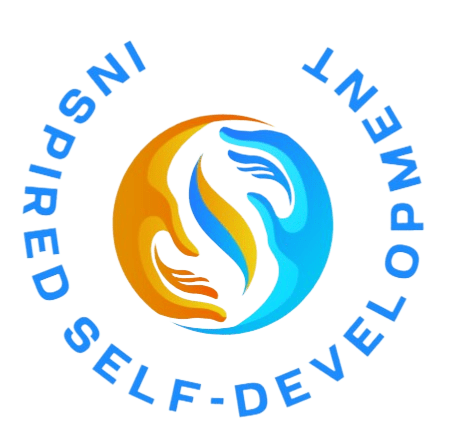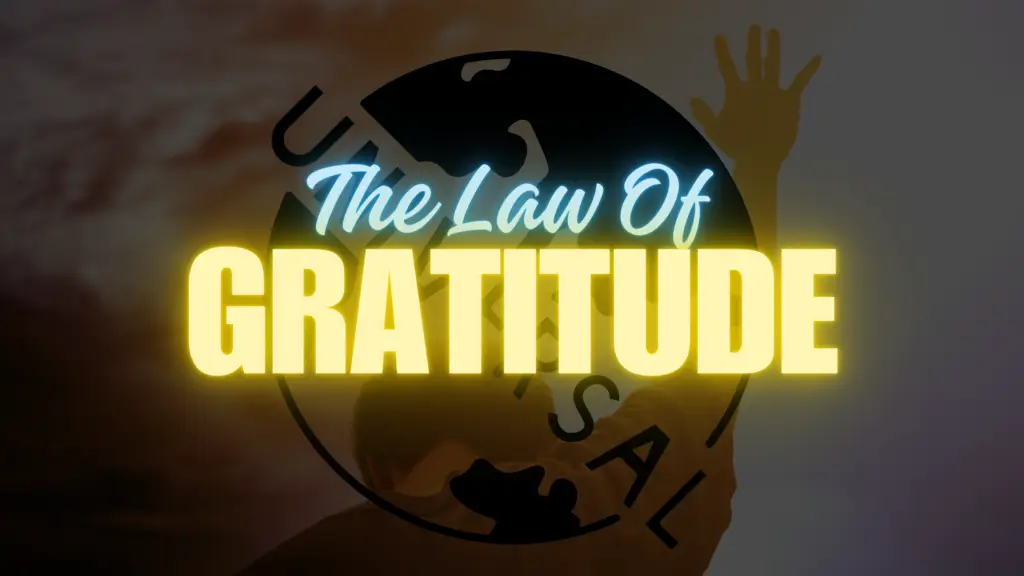Daily Routines
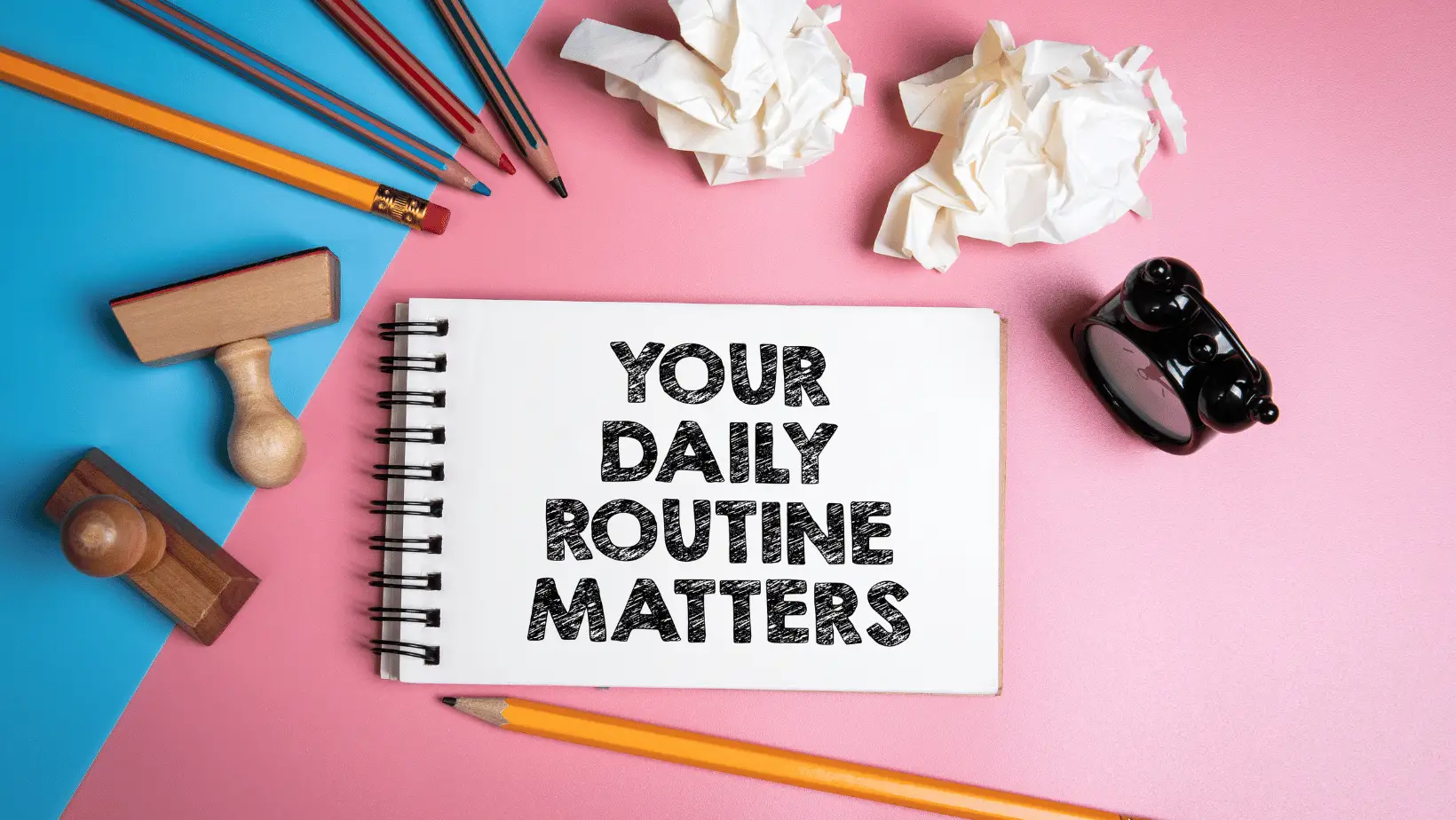
- Jose Flores
Share Article:
Your High-Performance Potential
At first glance, the topic of daily routines may not immediately spark excitement; however, I urge you to reconsider their profound impact on our daily existence. Routines act as the unsung heroes quietly orchestrating our achievements, health, and overall happiness. They provide the structure upon which productivity thrives, serve as the foundation for habit formation, and protect our mental and physical well-being. This blog aims to explore the pivotal role routines play in our lives, detailing their benefits and guiding you on crafting a morning routine that not only fits your lifestyle as snugly as your favorite pair of jeans but also enhances your capacity for achievement, mindfulness, and well-being. Join me as we uncover the hidden power of routines and their transformative potential in our everyday lives.
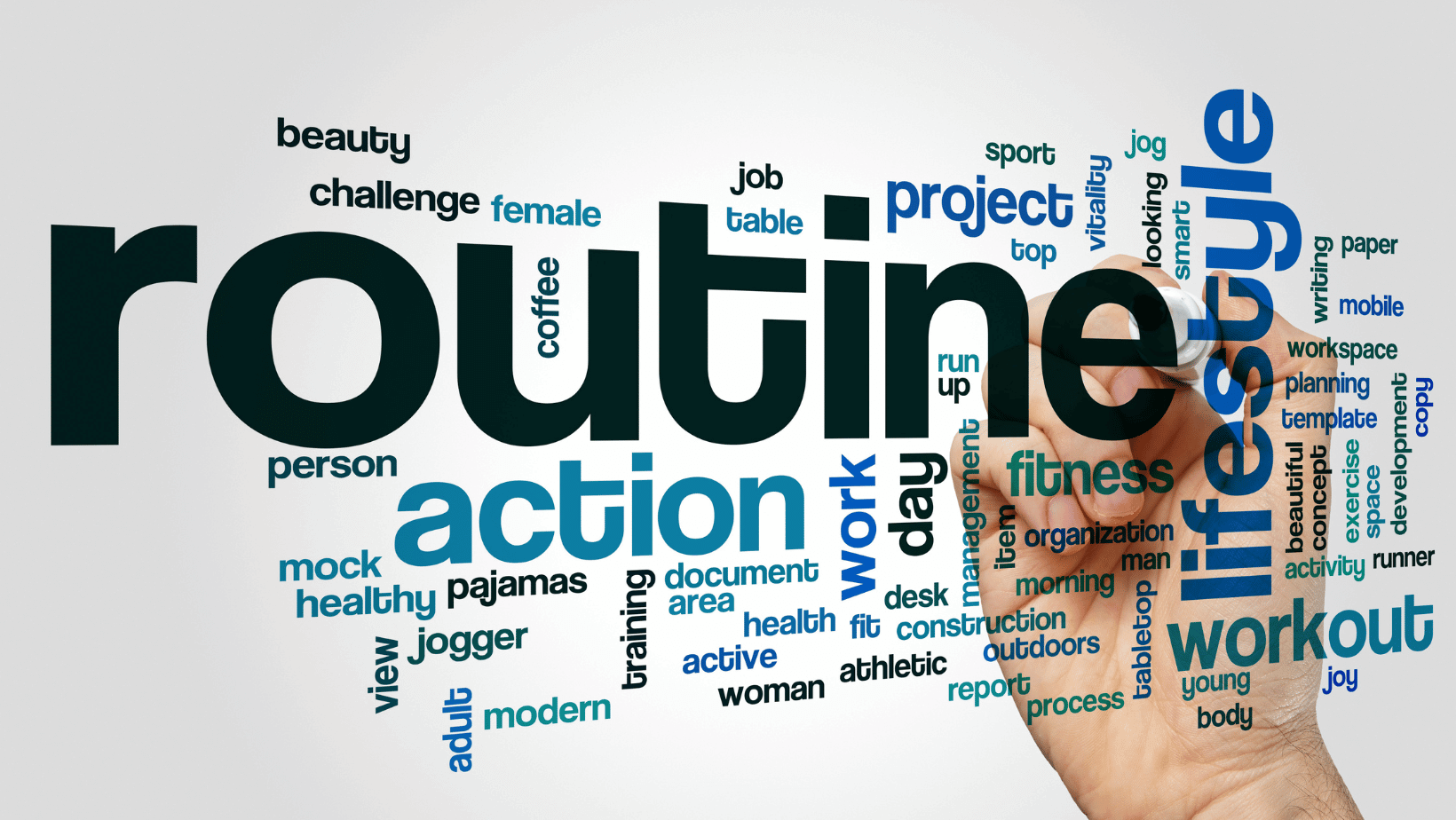
What Are Routines?
Routines are structured sequences of actions or behaviors that we perform regularly, often on a daily or weekly basis. These sequences become habitual over time, requiring less mental effort to initiate and carry out, thereby streamlining our daily lives. Routines can encompass a wide range of activities, from our morning rituals of getting ready for the day to the way we wind down at night. They serve as the scaffolding for our daily activities, providing a framework that can help reduce stress, increase efficiency, and support the achievement of our personal and professional goals. By establishing and maintaining routines, we create a sense of stability and predictability in our lives, which can be particularly beneficial in times of uncertainty or change.

This illustration vividly captures the dual nature of our journey towards personal growth. The transformative power of routines and the pervasive distractions that challenge our progress. It depicts a pathway from chaos, cluttered with symbols of modern distractions like smartphones, television, junk food, and social media, to a clear, structured road leading to a promising sunrise. This visual narrative serves as a poignant reminder of the obstacles we face in our quest for success and how steadfast dedication to our routines can guide us through, leading to a brighter, more focused future despite the allure of distractions.
Why Daily Routines Are Important?
Routines play a crucial role in our daily lives, serving as the foundation upon which we build our days. Their importance cannot be overstated, as they impact various aspects of our well-being, productivity, and overall happiness. Here are several reasons why routines are so vital:
Enhances Productivity and Efficiency
Routines help streamline our daily tasks, reducing the time and energy required to make decisions about what to do next. By having a set schedule for certain activities, we can move seamlessly from one task to another, increasing our productivity and allowing us to accomplish more with less mental fatigue.
Reduces Stress and Anxiety
Knowing what to expect each day provides a sense of security and control, which can significantly reduce stress and anxiety levels. They also eliminate the uncertainty that often leads to worry, making our days more predictable and manageable.
Improves Health and Well-being
Regular routines often include habits that contribute to our health, such as exercise, meditation, and proper nutrition. By incorporating these activities into our daily schedules, we are more likely to maintain them, leading to improved physical and mental health.
Supports Goal Achievement
They break down our long-term goals into daily actions, making them more attainable. Consistent effort towards a goal, facilitated by a routine, accumulates over time, leading to significant progress and eventual achievement.
Fosters Good Habits and Breaks Bad Ones
A routines make it easier to form good habits and eliminate bad ones. By consistently following a positive routine, we reinforce good behaviors until they become automatic, while also providing a structure that makes it easier to avoid negative patterns.
Enhances Time Management
With a routine in place, we can allocate our time more effectively, ensuring that important tasks get the attention they deserve. This leads to better time management and a more balanced distribution of effort throughout the day.
Improves Sleep Patterns
A consistent routine, especially one that includes a regular sleep schedule, can significantly improve the quality of our sleep. Going to bed and waking up at the same time each day helps regulate our body’s internal clock, leading to better sleep and more energy during the day.
Strengthens Relationships
By setting aside regular times for social activities within our routines, we can ensure that our relationships with friends and family are nurtured. Consistent interaction strengthens bonds and ensures that important relationships are maintained.
In summary, routines are more than just a way to organize our day; they are a tool for enhancing almost every aspect of our lives. From boosting productivity to improving health, and from achieving goals to strengthening relationships, the importance of routines cannot be overstated.
What's the Difference Between Routine and Habits?
Understanding the distinction between routines and habits is crucial for effectively organizing our daily lives and achieving our goals. While both concepts are related to patterns of behavior, they have distinct characteristics and functions.
Routines
Definition: A routine is a series of actions or behaviors that you perform in a specific order, regularly. Routines are consciously designed sequences that require a level of deliberate engagement and decision-making to initiate and follow through.
Purpose: The main purpose of a routine is to structure your day, enhance productivity, and ensure that specific tasks are completed within a set timeframe. Routines are often geared towards achieving particular goals or maintaining a certain level of performance or well-being.
Flexibility: Routines can be adjusted according to changing needs, goals, or circumstances. They are not automatic and require a conscious effort to maintain, which means they can be more easily modified than habits.
Habits
Definition: A habit is a behavior that has become automatic through repetition. Habits are actions that we perform without conscious thought or decision-making, triggered by specific cues or contexts.
Purpose: The purpose of a habit is to reduce the cognitive load on our brains by making certain actions automatic. This efficiency allows us to perform daily tasks without expending significant mental energy on decision-making.
Formation: Habits are formed through the process of cue, routine, and reward. Over time, this cycle leads to the behavior becoming automatic. Changing a habit requires breaking this cycle and creating a new one, which can be challenging due to the automatic nature of habits.
Key Differences
Conscious Effort: Routines require a conscious effort to execute, whereas habits are automatic responses to cues.
Flexibility vs. Stability: Routines are more flexible and can be changed more easily, while habits are relatively stable and require more effort to modify.
Purpose and Structure: Routines are structured sequences of actions aimed at achieving specific goals, while habits are individual behaviors that become automatic over time.
Interplay Between Routines and Habits
Although different, routines and habits are interconnected. A well-designed routine can help foster the development of positive habits by repeatedly exposing you to the same cues and rewards. Conversely, existing habits can be incorporated into routines to enhance efficiency and effectiveness. Understanding and leveraging the dynamics between routines and habits can significantly impact personal development, productivity, and overall well-being.
Related: How to Create A Routine
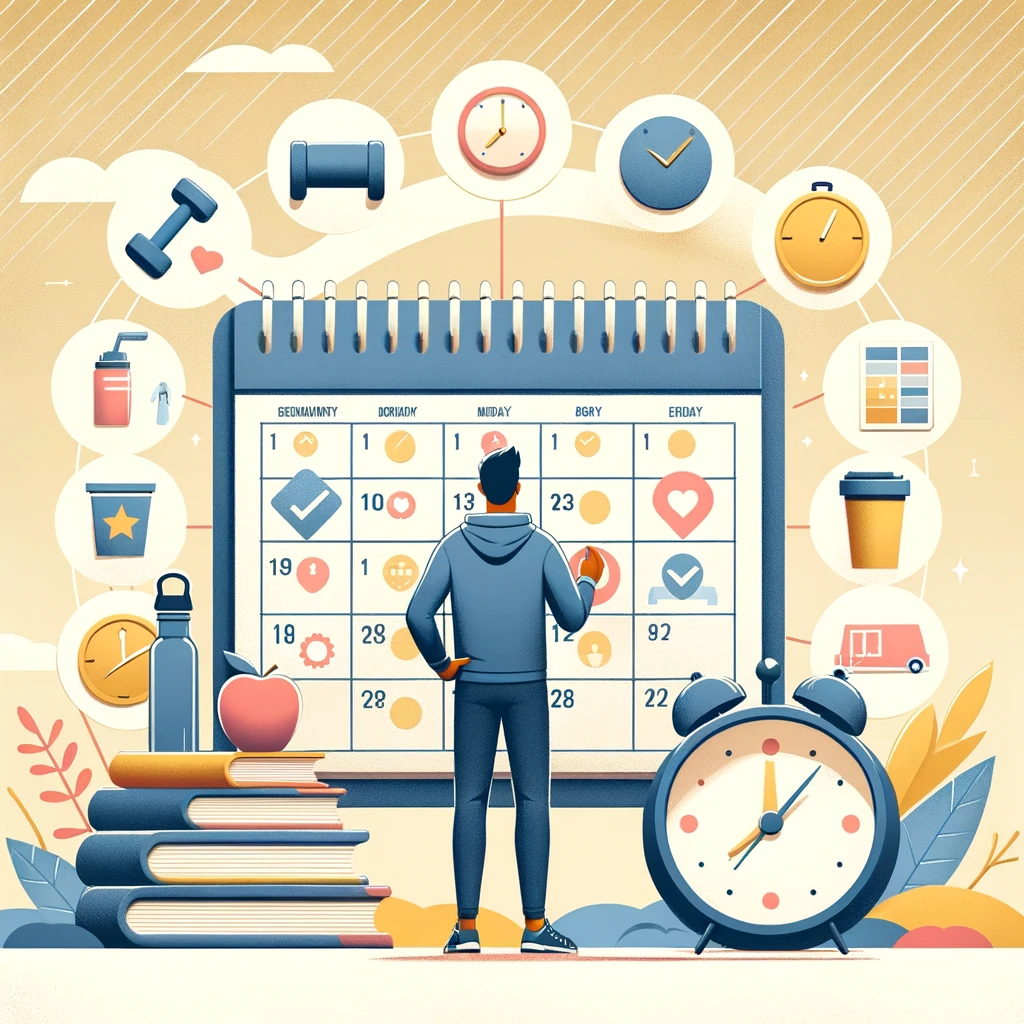
This vibrant illustration vividly illustrates the concept of tailoring a daily routine to align perfectly with your unique lifestyle and aspirations. It showcases an individual engaging with a dynamic, customizable planner, surrounded by floating icons representing different activities and habits. Each icon, from the book symbolizing learning to the dumbbell for physical fitness, reflects the thoughtful selection of components that make up a personalized routine. This visual metaphor emphasizes that effective routines aren't one-size-fits-all but carefully curated collections of habits and tasks. These routines cater to individual goals, energy levels, and preferences, ultimately guiding towards a more organized, productive, and satisfying life
How to Build a Daily Routine for You
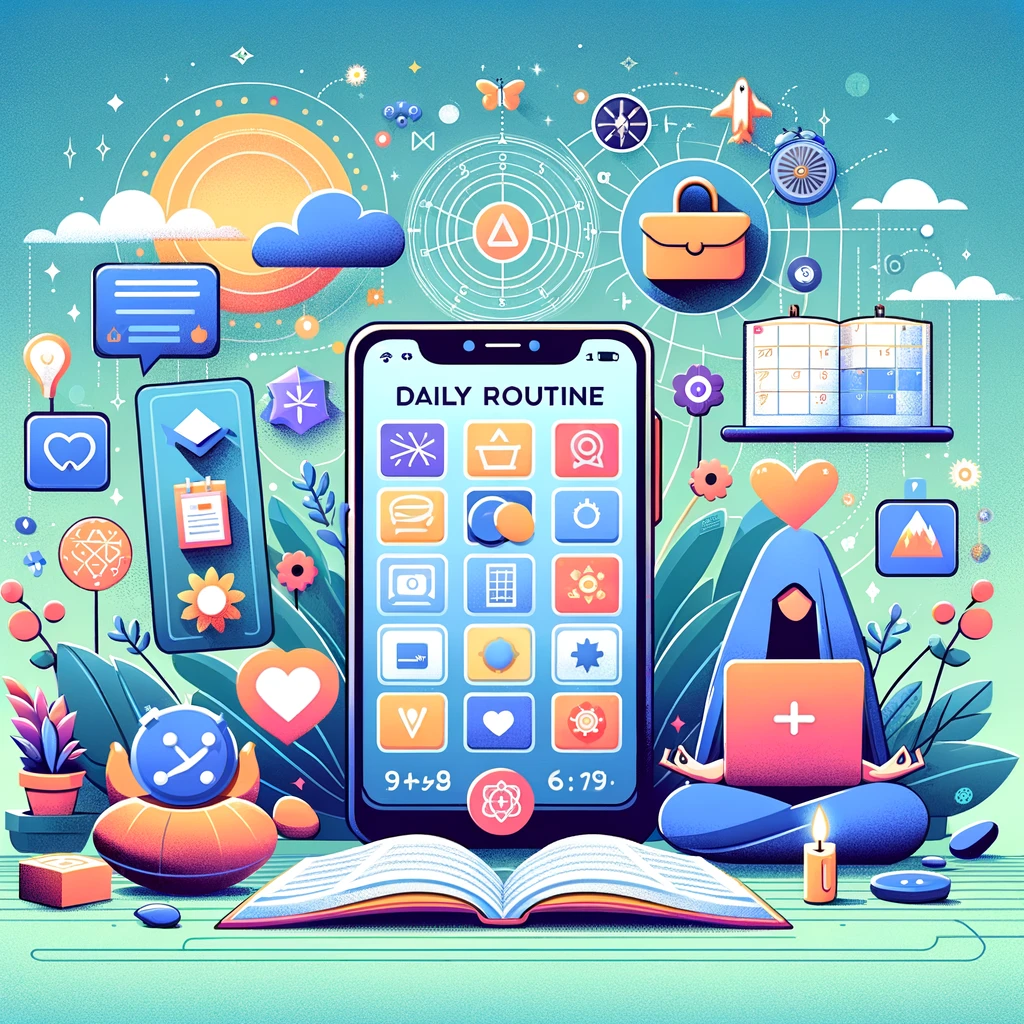
This image showcases tools for daily routines, blending digital and physical elements: a smartphone with productivity apps, a planner for scheduling, a meditation cushion for mindfulness, and icons for online learning platforms. It emphasizes a balanced approach, integrating technology, personal planning, and self-care for a fulfilling daily life.
Creating a daily routine that’s tailored to your personal needs, preferences, and lifestyle is essential for ensuring it’s both effective and sustainable. Here’s a step-by-step guide to building a routine that fits you perfectly:
Reflect on Your Goals
Start by considering what you want to achieve with your routine. Whether it’s improving your health, productivity, or simply finding more time for hobbies, having clear goals will help guide the structure of your routine.
Assess Your Current Habits
Take stock of your current daily habits, both good and bad. Identify which habits support your goals and which ones might be hindering your progress. This assessment will help you understand what changes need to be made.
Prioritize Your Activities
Based on your goals, decide which activities are most important to you. Prioritizing helps ensure that these activities get a reserved spot in your routine, making it more likely that you’ll stick to them.
Consider Your Natural Rhythms
Are you a morning person or a night owl? Design your routine around the times when you’re most energetic and productive. Aligning your tasks with your natural rhythms can make your routine feel more effortless and enjoyable.
Start Small
Don’t try to overhaul your entire day at once. Begin with small, manageable changes that you can consistently maintain. Gradually add more elements to your routine as you become comfortable with these initial changes.
Incorporate Flexibility
Life is unpredictable, so it’s important to build some flexibility into your routine. Allow room for adjustments and unexpected events so that you can stay on track without getting discouraged by minor setbacks.
Create a Balance
Make sure your routine includes a mix of productivity, self-care, relaxation, and social activities. A balanced routine ensures that all aspects of your well-being are addressed, leading to a more fulfilling day-to-day life.
Test and Adjust
After implementing your new routine, give it some time, and then reflect on how it’s working for you. Don’t hesitate to make adjustments based on what you’ve learned about your preferences and what’s most effective for achieving your goals.
Use Tools and Resources
Consider using apps, planners, or alarms to help you stay organized and remind you of your routine tasks. These tools can be incredibly helpful for keeping you on track, especially in the early stages of establishing your routine.
Be Patient and Persistent
Building a new routine and making it stick takes time and patience. Expect some challenges along the way, but remain persistent. Over time, your new routine will become a natural part of your day.
By following these steps, you can create a personalized routine that not only meets your unique needs and goals but also enhances your overall quality of life. Remember, the most effective routine is one that you enjoy and can stick to in the long run.
My Personal Routine
Through trial and reflection, I adjusted my routine to better suit my evolving preferences and goals, employing tools and resources like apps and planners for seamless integration into my daily life. This journey of patience and persistence culminated in a morning ritual that truly resonates with me; I carefully choreographed a sequence designed not just to start my day but to enrich it with purpose, performance, and peace. Here’s how:
Make the Bed: My day begins with making my bed, a simple act that sets a tone of discipline and accomplishment. Inspired by Charles Duhigg’s insights, this task is more than tidying; it’s the first victory of the day, sparking a series of productive actions.
Brush Teeth with the Non-Dominant Hand: This small change challenges my brain, promoting cognitive flexibility and mindfulness, breaking the monotony of routine with a simple but effective twist.
Drink 16oz of Water: Hydrating first thing in the morning kickstarts my metabolism and energizes my body, preparing me for the day ahead with a simple yet impactful ritual.
Step Outside for Sunlight: Merging with the morning sun for at least 10 minutes sets my circadian rhythm, boosts my alertness, and fortifies my immune system, grounding me in the natural rhythm of the day.
One Hour of Exercise: Dedication to physical activity clears my mind and primes my body, ensuring I’m ready for whatever the day holds, embodying the essence of a holistic approach to well-being.
to this: Creating a routine that’s tailored to your personal needs, preferences, and lifestyle is essential for ensuring it’s both effective and sustainable.
Resources for Building and Sustaining Life-Enhancing Routines
Developing and maintaining routines can be significantly enhanced with the right resources. These tools not only help in establishing a solid routine but also ensure its longevity and adaptability to your changing needs. Here are several resources that can be invaluable in this process:
Planners and Journals
Physical Planners: For those who prefer writing things down, a physical planner can be a powerful tool for mapping out daily, weekly, and monthly routines.
Digital Planners: Apps like Google Calendar, Trello, or Notion offer customizable planning solutions that can be accessed from anywhere, allowing for easy adjustments and reminders.
Habit Tracking Apps
Apps such as Habitica, Streaks, and HabitBull turn habit formation into a game, providing motivation through rewards and streaks for consistency in performing daily routines.
Time Management Tools
Pomodoro Timers: Tools like TomatoTimer or Focus Booster use the Pomodoro Technique to break work into intervals, which can be a part of your productivity routine.
Time Tracking Apps: Apps like Toggl Track help you understand how you spend your time, allowing for more informed adjustments to your routine.
Mindfulness and Meditation Apps
Applications such as Headspace and Calm offer guided meditation sessions that can be incorporated into morning or evening routines to enhance mindfulness and relaxation.
Fitness Trackers and Apps
Devices like Fitbit or apps such as MyFitnessPal and Nike Training Club can help maintain a routine of physical activity by tracking progress, setting reminders, and providing workout ideas.
Educational Platforms
Platforms like Coursera, Khan Academy, or Duolingo are excellent for incorporating learning into your routine, offering a wide range of courses and lessons that fit various schedules.
Meal Planning and Nutrition Apps
Apps like Mealime and MyPlate help in creating healthy eating habits by simplifying meal planning, grocery shopping, and nutritional tracking as part of your daily routine.
Sleep Trackers
Devices and apps that monitor sleep patterns, such as Sleep Cycle, can be crucial for establishing a healthy sleep routine, providing insights into your sleep quality and helping adjust bedtime habits accordingly.
Social Support Networks
Joining community forums or social media groups related to your interests and goals can provide motivation, accountability, and support as you work on establishing and maintaining your routines.
Professional Guidance
Coaches, therapists, or personal trainers can offer personalized advice and support tailored to your specific needs, helping you to develop and stick to your routines more effectively.
Incorporating these resources into your life can provide the structure, motivation, and support needed to develop and maintain effective routines. By leveraging technology, community, and professional advice, you can create a system that not only helps you stick to your routines but also adapts to your evolving goals and preferences.
Conclusion
Conclusion: Establishing routines sets the compass for daily growth, productivity, and well-being. Incorporating habits fosters stability and fulfillment. Crafting the perfect routine is personal, requiring patience and adaptability. With available tools, building a structured life is easier. Embrace building routines with openness. Profound changes come from consistent actions.
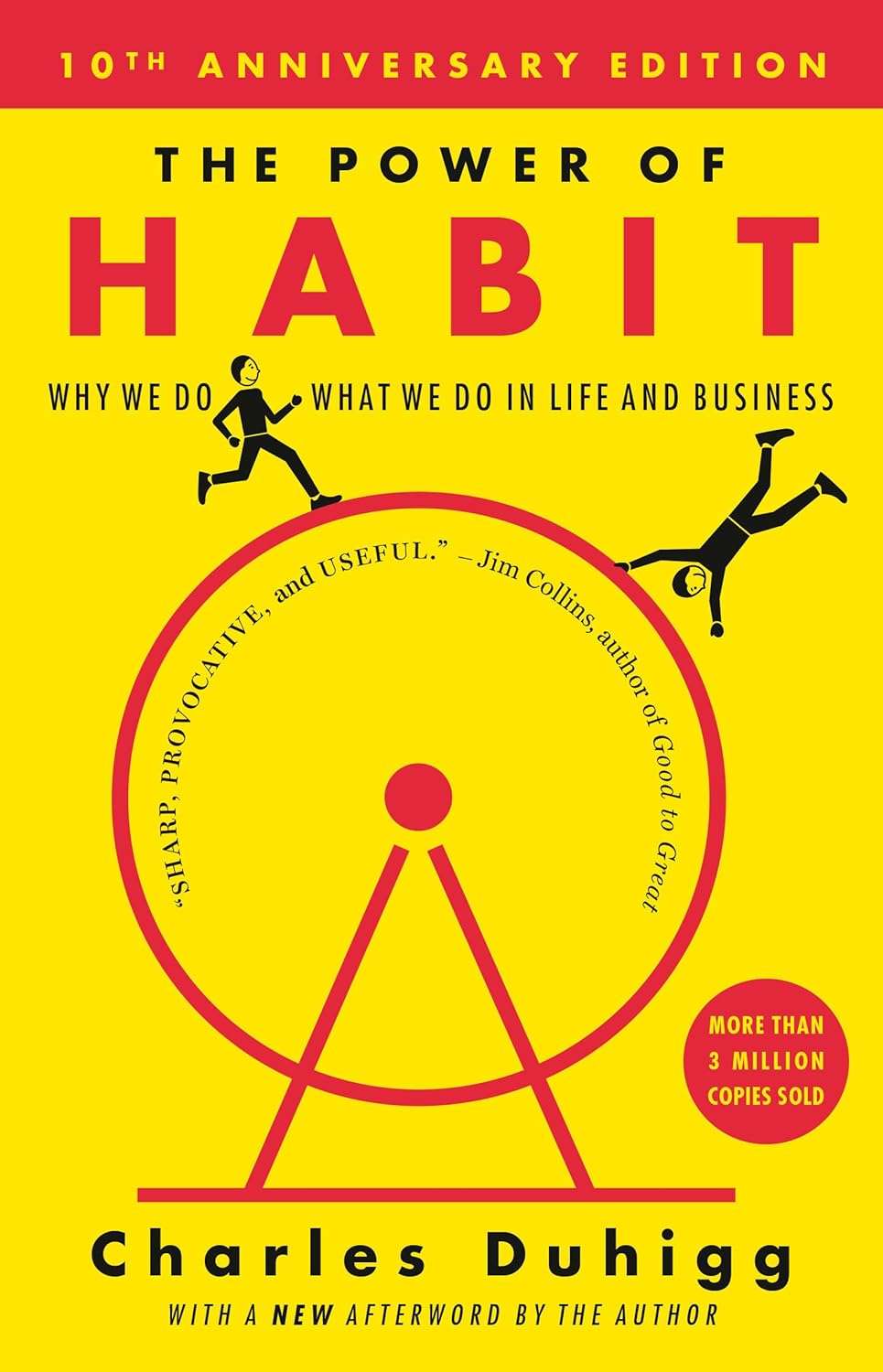
The Power of Habit
"The Power of Habit" by Charles Duhigg explores the science behind why habits exist and how they can be changed. The book delves into the psychology and neuroscience of habit formation, illustrating through a variety of engaging stories and studies how habits shape our lives, businesses, and societies. Duhigg introduces the concept of the "habit loop," which consists of a cue, a routine, and a reward, and explains how understanding and leveraging this loop can lead to significant changes in behavior. He also discusses the importance of belief and community in altering habits. Through its insights, "The Power of Habit" offers readers practical advice on identifying and transforming their habits to improve their lives, making it a powerful tool for personal and professional development.
- All Posts
- Mindset Mastery
- Self-Development
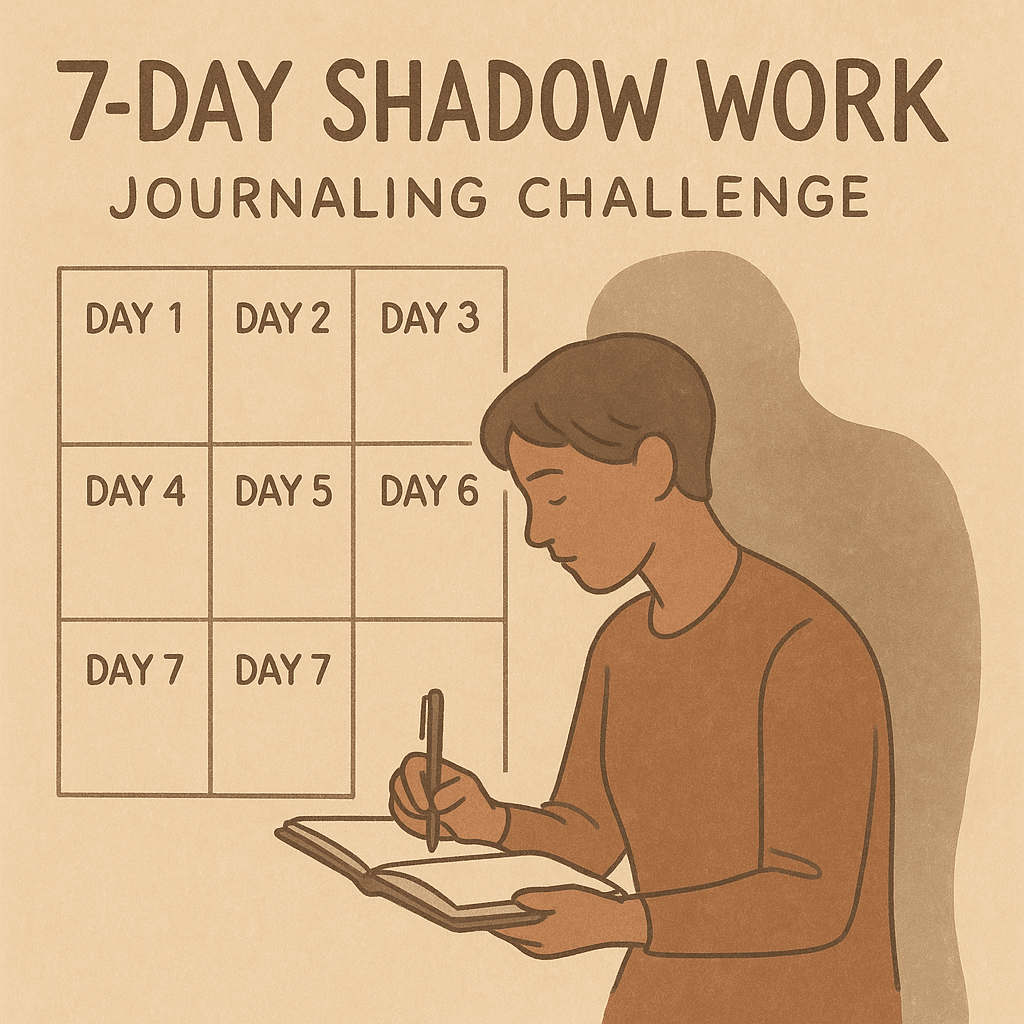
Unearth the parts of yourself you’ve hidden with “What Is Shadow Work?”—a concise guide featuring a 7-day journaling challenge, expert...

Delayed gratification is a powerful skill that can transform your life by prioritizing long-term rewards over immediate desires. Discover its...
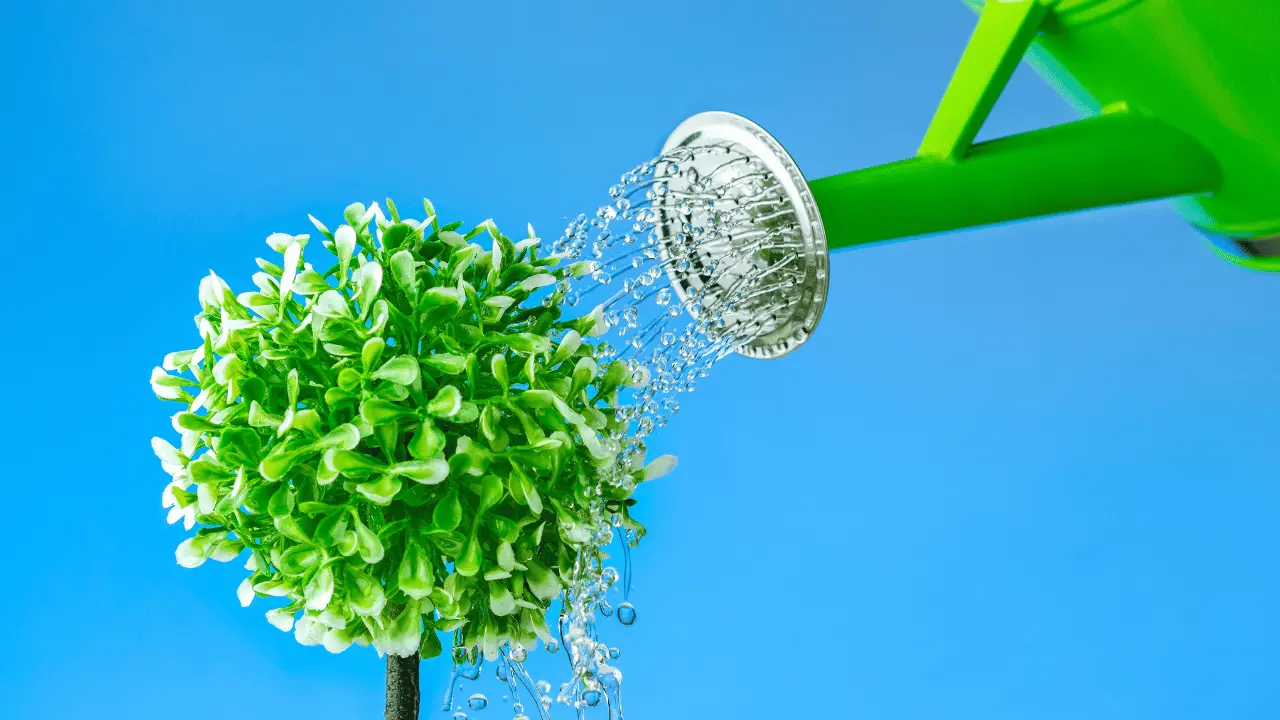
Explore practical tips and insights for creating a conducive environment that promotes personal growth and development.

Systematic self-improvement techniques stand out as essential tools for achieving success and fulfillment. These techniques are not just about sporadic...
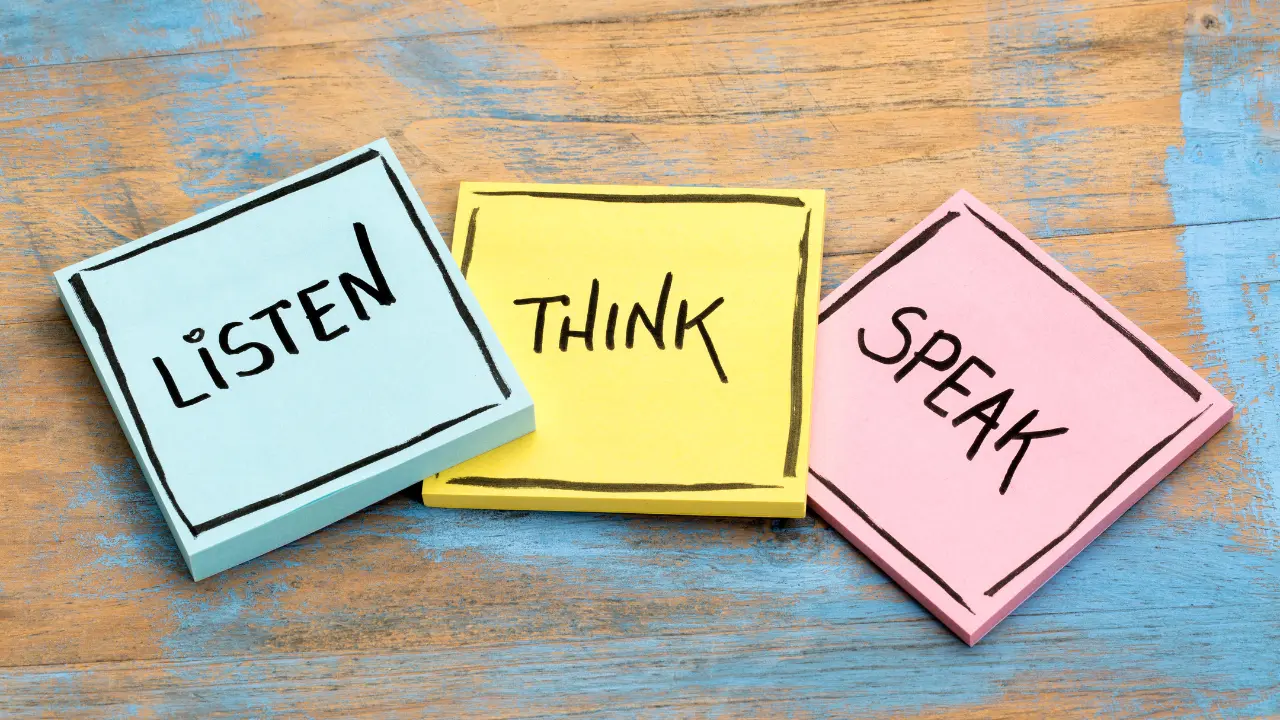
Articulation is not merely about the accuracy of speech; it encompasses the ability to express thoughts in a clear, effective,...

In an age where the written word can be both a sword and a shield, being literate transcends merely being...
Welcome

Hey there! I’m Jose Flores, your guide on this journey of self-discovery and inspired living. As a passionate advocate for personal development, I believe that every small step we take leads to profound transformation. Join me as we navigate the twists and turns of life, uncovering the secrets to self-mastery, mindfulness, and positive growth
